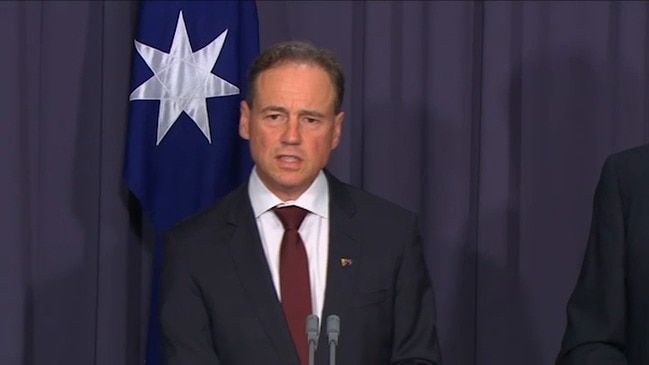Iran’s coronavirus boast backfires as country becomes new disease epicentre
Iran bragged the coronavirus wouldn’t be a problem and even exported face masks. Now it’s the deadliest spot outside China.

Just weeks ago, as the coronavirus began ripping a deadly path of destruction through China, Iranian leaders boasted the nation would not succumb to the disease.
Now Iran has emerged as a new epicentre for COVID-19, officially recording 77 deaths and more than 2,300 confirmed cases since it announced its first case on February 20.
Not only has the virus well and truly taken hold in the Gulf nation, it has decimated the government, with nearly three dozen Iranian officials and members of parliament infected.
One of them, 71-year-old Mohamma Mirmohammadi, a senior adviser to Iranian Supreme Leader Ayatollah Ali Khamenei, died on Monday.
Hadi Khosroshahi, One of the country’s top clerics, died last Thursday. Vice President Masoumeh Ebtekar and Deputy Health Minister Iraj Harirchi, who was heading the government’s task force on coronavirus, have also fallen ill, according to state media.
But while the official statistics paint a worrying picture, observers believe the true figures are much higher, with activists and journalists accusing the Iranian leadership of a cover up.
Australia’s Chief Medical Officer Brendan Murphy has also questioned the statistics, saying the death-to-reported cases ratio suggested the actual case numbers of coronavirus in Iran were “materially understated”.
Medical experts said based on the expected death rate, a figure of 77 deaths suggested the total number of infected was in excess of 4000, the New York Times reported.


The virus, which causes the deadly COVID-19 pneumonia, started spreading through Iran last week, and by Monday it had officially claimed 66 lives. Since then the number of confirmed cases have surged to 2,336 and by Wednesday there had been 10 more deaths.
Outbreaks in other countries, including Australia, have also been linked to travellers returning from Iran.
THOUSANDS OF PRISONERS RELEASED OVER VIRUS
Iran has temporarily released more than 54,000 prisoners in an effort to combat the spread of the virus in crowded jails.
Judiciary spokesman Gholamhossein Esmaili told reporters the inmates were freed after testing negative for COVID-19 and posting bail.
The measure applies only to short term prisoners and those sentenced to more than five years for serious crimes will not be let out, he said, according to the BBC.
British authorities are waiting to see if jailed British-Iranian charity worker Nazanin Zaghari-Ratcliffe will be among those granted temporary release.
London MP Tulip Siddiq cited the Iranian ambassador to the UK as saying that Ms Zaghari-Ratcliffe “may be released on furlough today or tomorrow”.



Meanwhile Australia’s health department may advise members of the Iranian community to
avoid local Iranian New Year’s Celebrations due to the coronavirus.
The likely advice comes as authorities urge anyone who has returned to Australia from Iran since February 19 to self-isolate at home for 14 days.
The nation’s chief medical officer told a Senate estimates hearing in Canberra on Wednesday the government wasn’t yet looking to advise the general public to avoid large public gatherings.
“The Iranian New Year’s celebrations are coming up in a few weeks; we are considering making a recommendation to that community because of its high risk,” Dr Brendan Murphy said.
Biosecurity legislation would allow authorities to ban people from mass public gatherings, but Dr Murphy said simply giving advice to Australians would do.
“The Australian population is very cooperative,” he said.
Dr Murphy said the death-to-reported cases ratio suggested the actual case numbers of coronavirus in Iran were “materially understated”.
Australian public health laboratories have now confirmed several cases of COVID-19 in people with direct or indirect travel history to Iran.
All confirmed cases have been isolated and are receiving medical treatment, while all states and territories have begun tracing.
“It is clear that the Iranian health system is managing a large number of cases which have developed over a short period of time and as a result, reporting of cases may have been delayed or underestimated,” Health Minister Greg Hunt said in a statement.
The Department of Foreign Affairs and Trade has increased its advisory level to “do not travel to Iran”.
Entry to Australia for people who have been in Iran in the past 14 days has been limited to Australian citizens, permanent residents and their dependants, for an initial 14-day period from March 1.
— With AAP



